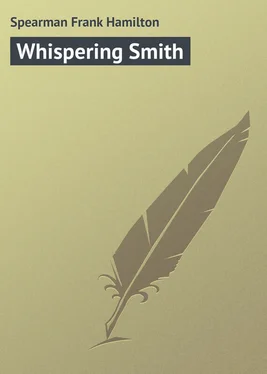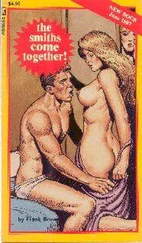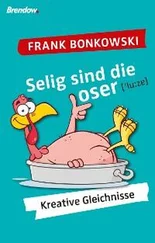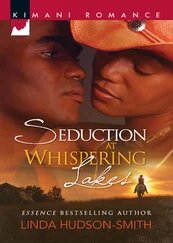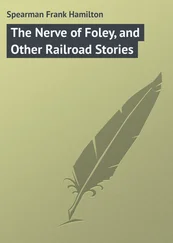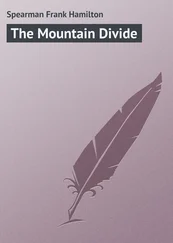Frank Spearman - Whispering Smith
Здесь есть возможность читать онлайн «Frank Spearman - Whispering Smith» — ознакомительный отрывок электронной книги совершенно бесплатно, а после прочтения отрывка купить полную версию. В некоторых случаях можно слушать аудио, скачать через торрент в формате fb2 и присутствует краткое содержание. Жанр: foreign_prose, foreign_adventure, на английском языке. Описание произведения, (предисловие) а так же отзывы посетителей доступны на портале библиотеки ЛибКат.
- Название:Whispering Smith
- Автор:
- Жанр:
- Год:неизвестен
- ISBN:нет данных
- Рейтинг книги:3 / 5. Голосов: 1
-
Избранное:Добавить в избранное
- Отзывы:
-
Ваша оценка:
- 60
- 1
- 2
- 3
- 4
- 5
Whispering Smith: краткое содержание, описание и аннотация
Предлагаем к чтению аннотацию, описание, краткое содержание или предисловие (зависит от того, что написал сам автор книги «Whispering Smith»). Если вы не нашли необходимую информацию о книге — напишите в комментариях, мы постараемся отыскать её.
Whispering Smith — читать онлайн ознакомительный отрывок
Ниже представлен текст книги, разбитый по страницам. Система сохранения места последней прочитанной страницы, позволяет с удобством читать онлайн бесплатно книгу «Whispering Smith», без необходимости каждый раз заново искать на чём Вы остановились. Поставьте закладку, и сможете в любой момент перейти на страницу, на которой закончили чтение.
Интервал:
Закладка:
Morris Blood was cut up over it, but George McCloud took it quietly. “I’m no worse off here than I was back there, Morris.” Blood, at that, plucked up courage to ask George to take a job in the Cold Springs mines, and George jumped at it. It was impossible to get a white man to live at Cold Springs after he could save money enough to get away, so George was welcomed as assistant superintendent at the Number Eight Mine, with no salary to speak of and all the work.
In one year everybody had forgotten him. Western men, on the average, show a higher heart temperature than Eastern men, but they are tolerably busy people and have their own troubles. “Be patient,” Morris Blood had said to him. “Sometime there will be more railroad work in these mountains; then, perhaps, your darned engineering may come into play. I wish you knew how to sell cigars.”
Meantime, McCloud stuck to the mine, and insensibly replaced his Eastern tissue with Western. In New England he had been carefully moulded by several generations of gentlemen, but never baked hard. The mountains put the crust on him. For one thing, the sun and wind, best of all hemlocks, tanned his white skin into a tough all-American leather, seasoned his muscles into rawhide sinews, and, without burdening him with an extra ounce of flesh, sprinkled the red through his blood till, though thin, he looked apoplectic.
Insensibly, too, something else came about. George McCloud developed the rarest of all gifts of temperament, even among men of action–the ability to handle men. In Cold Springs, indeed, it was a case either of handling or of being handled. McCloud got along with his men and, with the tough element among them, usually through persuasion; but he proved, too, that he could inspire confidence even with a club.
One day, coming down “special” from Bear Dance, Gordon Smith, who bore the nickname Whispering Smith, rode with President Bucks in the privacy of his car. The day had been long, and the alkali lay light on the desert. The business in hand had been canvassed, and the troubles put aside for chicken, coffee, and cigars, when Smith, who did not smoke, told the story of something he had seen the day before at Cold Springs that pleased him.
The men in the Number Eight Mine had determined to get rid of some Italians, and after a good deal of rowing had started in to catch one of them and hang him. They had chosen a time when McCloud, the assistant superintendent of the mine, was down with mountain fever. It was he who had put the Italians into the mine. He had already defended them from injury, and would be likely, it was known, to do so again if he were able. On this day a mob had been chasing the Dagos, and had at length captured one. They were running him down street to a telegraph pole when the assistant superintendent appeared in scant attire and stopped them. Taking advantage of the momentary confusion, he hustled their victim into the only place of refuge at hand, a billiard hall. The mob rushed the hall. In the farthest corner the unlucky Italian, bleeding like a bullock and insane with fright, knelt, clinging to McCloud’s shaky knees. In trying to make the back door the two had been cut off, and the sick boss had got into a corner behind a pool-table to make his stand. In his pocket he had a pistol, knowing that to use it meant death to him as well as to the wretch he was trying to save. Fifty men were yelling in the room. They had rope, hatchets, a sprinkling of guns, and whiskey enough to burn the town, and in the corner behind a pool-table stood the mining boss with mountain fever, the Dago, and a broken billiard-cue.
Bucks took the cigar from his mouth, leaned forward in his chair, and stretched his heavy chin out of his neck as if the situation now promised a story. The leader, Smith continued, was the mine blacksmith, a strapping Welshman, from whom McCloud had taken the Italian in the street. The blacksmith had a revolver, and was crazy with liquor. McCloud singled him out in the crowd, pointed a finger at him, got the attention of the men, and lashed him across the table with his tongue until the blacksmith opened fire on him with his revolver, McCloud all the while shaking his finger at him and abusing him like a pickpocket. “The crowd couldn’t believe its eyes,” Gordon Smith concluded, “and McCloud was pushing for the blacksmith with his cue when Kennedy and I squirmed through to the front and relieved the tension. McCloud wasn’t hit.”
“What is that mining man’s name?” asked Bucks, reaching for a message clip.
“McCloud.”
“First name?” continued Bucks mechanically.
“George.”
Bucks looked at his companion in surprise. Then he spoke, and a feeling of self-abasement was reflected in his words. “George McCloud,” he echoed. “Did you say George? Why, I must know that man. I turned him down once for a job. He looked so peaceable I thought he was too soft for us.” The president laid down his cigar with a gesture of disgust. “And yet there really are people along this line that think I’m clever. I haven’t judgment enough to operate a trolley car. It’s a shame to take the money they give me for running this system, Gordon. Hanged if I didn’t think that fellow was too soft.” He called the flagman over. “Tell Whitmyer we will stay at Cold Springs to-night.”
“I thought you were going through to Medicine Bend,” suggested Smith as the trainman disappeared.
“McCloud,” repeated Bucks, taking up his cigar and throwing back his head in a cloud of smoke.
“Yes,” assented his companion; “but I am going through to Medicine Bend, Mr. Bucks.”
“Do.”
“How am I to do it?”
“Take the car and send it back to-morrow on Number Three.”
“Thank you, if you won’t need it to-night.”
“I sha’n’t. I am going to stay at Cold Springs to-night and hunt up McCloud.”
“But that man is in bed in a very bad way; you can’t see him. He is going to die.”
“No, he isn’t. I am going to hunt him up and have him taken care of.”
That night Bucks, in the twilight, was sitting by McCloud’s bed, smoking and looking him over. “Don’t mind me,” he said when he entered the room, lifted the ill-smelling lamp from the table, and, without taking time to blow it out, pitched it through the open window. “I heard you were sick, and just looked in to see how they were taking care of you. Wilcox,” he added, turning to the nurse he had brought in–a barber who wanted to be a railroad man, and had agreed to step into the breach and nurse McCloud–“have a box of miner’s candles sent up from the roundhouse. We have some down there; if not, buy a box and send me the bill.”
McCloud, who after the rioting had crawled back to bed with a temperature of 105 degrees, knew the barber, but felt sure that a lunatic had wandered in with him, and immediately bent his feeble mental energies on plans for getting rid of a dangerous man. When Bucks sat down by him and continued talking at the nurse, McCloud caught nothing of what was said until Bucks turned quietly toward him. “They tell me, McCloud, you have the fever.”
The sick man, staring with sunken eyes, rose half on his elbow in astonishment to look again at his visitor, but Bucks eased him back with an admonition to guard his strength. McCloud’s temperature had already risen with the excitement of seeing a man throw his lamp out of the window. Bucks, meantime, working carefully to seem unconcerned and incensing McCloud with great clouds of smoke, tried to discuss his case with him as he had already done with the mine surgeon. McCloud, thinking it best to humor a crazy man, responded quietly. “The doctor said yesterday,” he explained, “it was mountain fever, and he wants to put me into an ice-pack.”
Bucks objected vigorously to the ice-pack.
Читать дальшеИнтервал:
Закладка:
Похожие книги на «Whispering Smith»
Представляем Вашему вниманию похожие книги на «Whispering Smith» списком для выбора. Мы отобрали схожую по названию и смыслу литературу в надежде предоставить читателям больше вариантов отыскать новые, интересные, ещё непрочитанные произведения.
Обсуждение, отзывы о книге «Whispering Smith» и просто собственные мнения читателей. Оставьте ваши комментарии, напишите, что Вы думаете о произведении, его смысле или главных героях. Укажите что конкретно понравилось, а что нет, и почему Вы так считаете.
